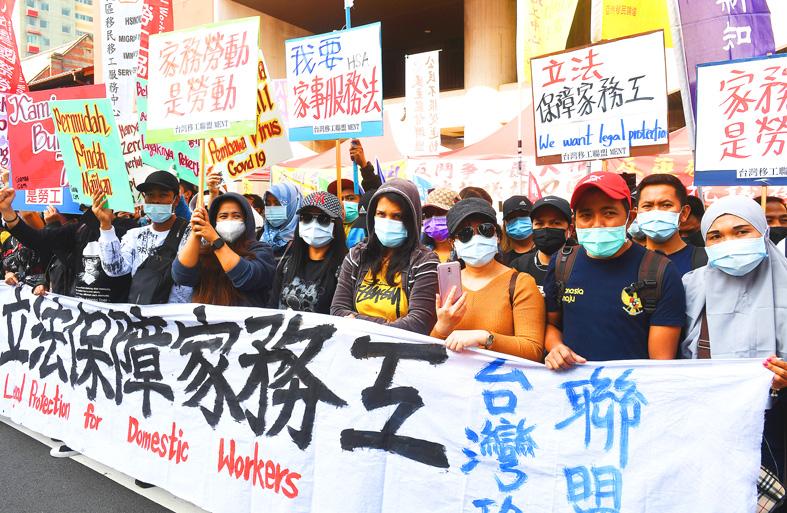About 200 migrant workers and workers’ rights advocates yesterday rallied in front of the Legislative Yuan in Taipei to push for legislation to guarantee legal protection for domestic workers.
At the heart of the protesters’ demands is a proposed “household service act” that the Migrants Empowerment Network in Taiwan (MENT) — a coalition of grassroots migrants’ rights organizations that organized the protest — has been pushing for since 2003.
Protesters held signs with messages reading “We want legal protection,” “We are not slaves and not products,” and “Stop human trafficking. Stop exploitation.”

Photo: CNA
Representatives of several groups, including MENT members such as the Taipei-based Taiwan International Workers’ Association, the Taoyuan-based Hope Workers’ Center and the Hsinchu Migrants and Immigrants Service Center, as well as supporters such as the Awakening Foundation, took part in the protest.
It has been nearly 30 years since Taiwan first allowed foreign domestic workers following the enactment of the Employment Service Act (就業服務法) in 1992, MENT said, adding that as of October this year, there were 701,240 migrant workers in Taiwan, about 33 percent of whom are domestic workers who are not protected by labor laws.
In October 2004, MENT, which was then named the Promoting Alliance of Household Service Act, proposed a draft “household service act” to protect the rights of domestic workers.
However, the Ministry of Labor never proposed a corresponding version, said the group, which was renamed in 2007.
Ahead of International Migrants Day on Friday, MENT said it would submit an updated version of its “household service act” proposal to the Legislative Yuan, as it urged the Executive Yuan to release its own version of the bill as soon as possible.
However, the ministry said that due to differences in the jobs performed by domestic workers employed by individuals and workers employed by businesses, the Labor Standards Act (勞動基準法) cannot apply to the former.
There would also be difficulties in pushing for a dedicated law, as it would be hard to distinguish between domestic workers’ working hours and rest periods, given they primarily work in homes, and it would be hard for different groups to reach a consensus on proposed regulations, the ministry said.
The Employment Service Act states that migrant workers should sign a contract with their employer, verified by their home country, before they arrive in Taiwan, the ministry said.
The contract should include items such as employers providing workers with enough rest time, it said, adding that Taiwan also negotiates with countries that are sources of migrant domestic workers on matters such as their minimum wage.
The ministry values the labor rights of migrant domestic workers, but it must also take into consideration the burden on the family members of the nation’s disadvantaged groups who employ them, it said.
It would promote measures to protect the rights of migrant domestic workers, it added.

CAUTION: Based on intelligence from the nation’s security agencies, MOFA has cautioned Taiwanese travelers about heightened safety risks in China-friendly countries The Ministry of Foreign Affairs (MOFA) yesterday urged Taiwanese to be aware of their safety when traveling abroad, especially in countries that are friendly to China. China in June last year issued 22 guidelines that allow its courts to try in absentia and sentence to death so-called “diehard” Taiwanese independence activists, even though Chinese courts have no jurisdiction in Taiwan. Late last month, a senior Chinese official gave closed-door instructions to state security units to implement the guidelines in countries friendly to China, a government memo and a senior Taiwan security official said, based on information gathered by Taiwan’s intelligence agency. The

The National Immigration Agency (NIA) said yesterday that it will revoke the dependent-based residence permit of a Chinese social media influencer who reportedly “openly advocated for [China’s] unification through military force” with Taiwan. The Chinese national, identified by her surname Liu (劉), will have her residence permit revoked in accordance with Article 14 of the “Measures for the permission of family- based residence, long-term residence and settlement of people from the Mainland Area in the Taiwan Area,” the NIA said in a news release. The agency explained it received reports that Liu made “unifying Taiwan through military force” statements on her online

Taiwan Semiconductor Manufacturing Co (TSMC), the world’s largest contract chipmaker, said yesterday that it is looking to hire 8,000 people this year, at a time when the tech giant is expanding production capacity to maintain its lead over competitors. To attract talent, TSMC would launch a large-scale recruitment campaign on campuses across Taiwan, where a newly recruited engineer with a master’s degree could expect to receive an average salary of NT$2.2 million (US$60,912), which is much higher than the 2023 national average of NT$709,000 for those in the same category, according to government statistics. TSMC, which accounted for more than 60 percent

Tung Tzu-hsien (童子賢), a Taiwanese businessman and deputy convener of the nation’s National Climate Change Committee, said yesterday that “electrical power is national power” and nuclear energy is “very important to Taiwan.” Tung made the remarks, suggesting that his views do not align with the country’s current official policy of phasing out nuclear energy, at a forum organized by the Taiwan People’s Party titled “Challenges and Prospects of Taiwan’s AI Industry and Energy Policy.” “Taiwan is currently pursuing industries with high added- value and is developing vigorously, and this all requires electricity,” said the chairman